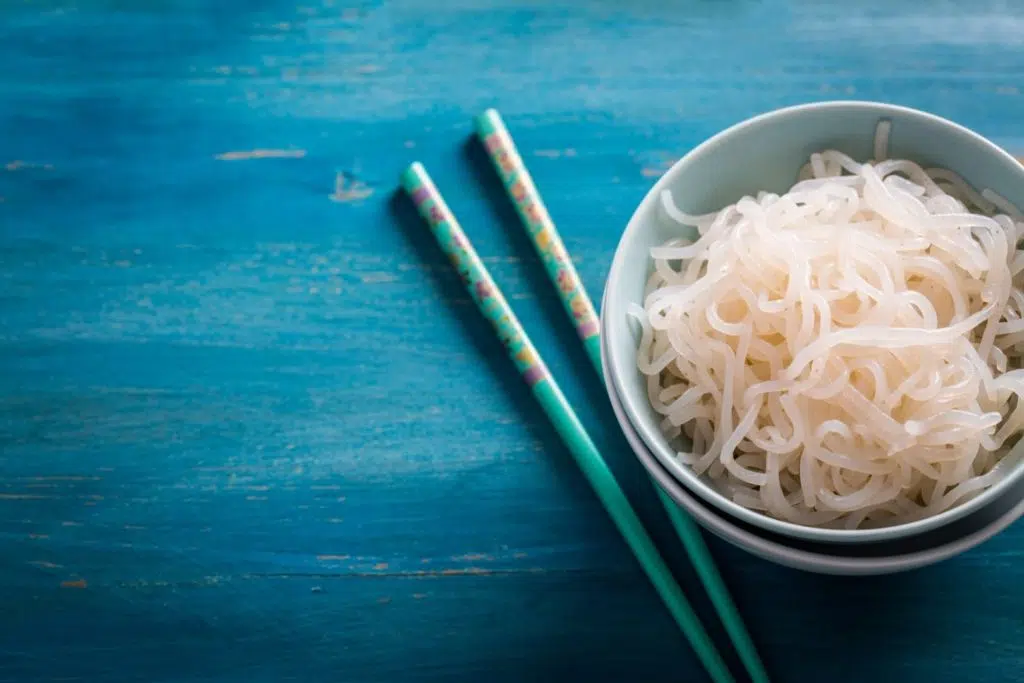Usually when you’re trying to restore your gut health, I recommend avoiding most bread, rice, pasta and white potatoes. These foods are all high GI, (rated high on the glycemic index) meaning that they burn to sugar inside your system very quickly.
In order to deal with this quick-sugar dump, your system releases a massive wave of insulin which destabilizes your microbiome and knocks all your precious gut critters off their perches. Imagine all this insulin rushing through your inner ecosystem like a tsunami through the rainforest, damaging your delicate gut biome in the process.
So what’s the answer? Eat foods that burn slowly inside your system, gently trickling blood sugar in over time. You want low GI foods – ideally 55 or lower on the GI scale. If you’re wondering about the GI rating of a certain food, it’s quick and easy to look it up – just type in “GI rating of…” and you’ll find the answer.
However this raises a certain problem – what can we eat for lunch?? What do we use to replace bread, pasta, rice and potatoes as a base for our sauces, toppings and flavourings?
Now there’s a new contender on the pasta front, only recently introduced to the UK. It’s ancient, it’s from Japan and it’s called “konjac noodles” or “Shirataki noodles.” In the UK these noodles are currently available as “Zero Noodles.”
In Japan, noodles made from ‘konjac four’ have been a dietary staple for 2000 years. Konjac noodles contain zero net calories, zero net carbs and have a glycemic index score of zero, meaning it will not spike your blood sugar levels at all – super gut friendly!
Konjac, also known as konjak, konjaku, konnyaku potato, devil’s tongue, voodoo lily, snake palm or elephant yam, is one of the starchiest vegetables on the planet. The indigenous people of China have used konjac to treat asthma, breast pain, coughs, hernias, burns and various skin disorders. Present day scientific studies have revealed that supplementing with konjac can significantly lower plasma cholesterol, improve carbohydrate metabolism, encourage bowel movements and promote a healthy colon.1
Konjac’s super-fibrous tubers are ground up into something called “glucomannan powder,” which is a beneficial, soluble and fermentable dietary fiber used in Asia for thousands of years as both food and traditional medicine.
Glucomannan is marketed for its ability to promote weight loss, and you may see it advertised in supplement form. However taking glucomannan in the form of konjac noodles is the safest and most reliable way to get this ancient health food into your diet.
Glucomannan powder also works as a prebiotic that feeds the friendly bacteria in the intestine. Like all prebiotics, it passes through the upper part of the gastrointestinal tract and remains undigested because the human body can’t fully break it down. But once prebiotics reach the colon, where they’re fermented by the gut microflora, they help nurture a healthy environment for helpful live cultures – like the ones found in your daily kefir!
Glucomannan noodles come sealed in water, in 200g packets.They must be boiled for at least three minutes. They look a little bit like rice noodles, but their texture is different to conventional noodles – a bit more more rubbery. They don’t have much flavour on their own, so you’ll need to top them with a tasty sauce to add flavour.
The noodles contain 96 percent water and less than 4 percent glucomannan fibre. So it’s surprising that they fill you up as much as they do, but they are well-known as a “bulking” or filling food, which can be helpful if you’re trying to shed a bit of extra weight.
Glucomannan powder is also great for diabetics; there are more than 20 scientific studies involving glucomannan and diabetes. One of the ways it can help diabetics is by delaying the stomach’s natural emptying process, which leads to more gradual sugar absorption and lower blood sugar levels after meals.
In fact, konjac is considered so effective at lowering blood sugar that diabetics who are already taking blood-sugar-lowering medication are advised to exercise caution, monitoring blood sugar levels closely to make sure they don’t drop too low. Speak with your doctor to see if the dose of your diabetes medication might need to be changed to account for the glucomannan. Also due to blood sugar effects, stop using it at least two weeks before any scheduled surgery.
If you’re pregnant or breastfeeding, it’s best to avoid glucomannan products since the safety of taking them under these conditions is still unclear. If you have any medical condition or are taking medication already, consult a doctor before taking glucomannan.
Give these ancient superfood noodles a try, and let me know how you get on! I’d love to know what you think.














